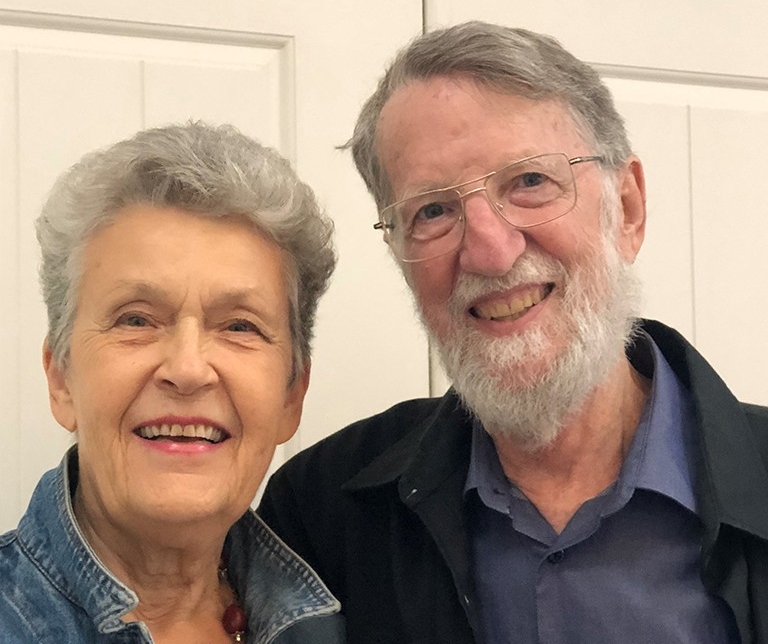William ‘Bill’ Reimer (1944-2024): ‘He created space for students to grow, learn and become accomplished researchers’
 William Reimer and his wife, Frances Shaver
William Reimer and his wife, Frances Shaver
William Reimer, beloved professor emeritus of sociology and anthropology at Concordia, devoted mentor and central figure in rural research for decades, passed away on July 15 in Vancouver.
“Bill made an enormous contribution to the study and improvement of rural communities,” says his wife, Frances Shaver, recent recipient of the Order of Canada and professor emeritus in Concordia’s Department of Sociology and Anthropology. “He provided invaluable mentorship to his many graduate students and research assistants.”
Reimer did not formally study or teach rural sociology, but the self-proclaimed “accidental rural sociologist” grew more comfortable with the label later in life.
“I realize the many ways in which my interests in the natural sciences, humanities, methodologies, communities and inequality have merged in my analysis of rural places and spaces,” Reimer wrote in a 2015 edited collection called Rural Sociologists at Work.
“Rural matters, urban matters and, most of all, the interdependence among rural and urban places matters. Understanding the dynamics of that interdependence, therefore, is a worthwhile preoccupation for research, analysis, insights and ambitious dreams.”
The path to rural sociology
Born and raised in Vancouver, Reimer was drawn to rural life from an early age. He recounted fondly cherished visits to his grandparents’ farm and his parents’ passion for rural exploration. Each had a profound impact on Reimer’s future life work:
“It gave me my first taste of rural places and the joys of visiting small towns,” he wrote.
Reimer took a first sociology class in the final year of his undergraduate studies at the University of British Columbia. He went on to obtain an MA and then, in 1972, a PhD in Sociology.
The next year, Reimer, Shaver and their young children, moved to Montreal so he could begin a position at Concordia (then Sir George Williams University). But it was a 1978 sabbatical in Cap-Saint-Ignace that would transform all their lives.
“My research during that year also shifted my focus from the impacts that technology might have on the organization of farming, to the community itself,” he wrote. “I had started on the path to rural sociology.”
Reimer went on to become a central figure in rural research for decades, serving as the lead for the New Rural Economy (NRE) project, the largest-ever Social Sciences and Humanities Research Council (SSHRC)-funded research project at the time ($3 million). Research colleagues from several Canadian institutions were involved as co-investigators.
Former assistant to the dean of the Faculty of Arts and Science at Concordia, Madeleine Yates, came out of retirement upon Reimer’s proposal that she work with him on the NRE project. She was his friend, neighbour and colleague for more than 30 years.
“Bill was one of the most erudite people I have ever met,” Yates says. “He was kind, thoughtful, interested and interesting. He was an inspired teacher, and it was wonderful to observe his skill in mentoring his students. He created space for them to grow, learn and become accomplished researchers.
“His passing will leave a huge gap in the lives of so many.”
Reimer conducted research on issues relating to rural Canada, with particular focus on social inclusion and exclusion. He looked at the impact technology, transition and wildfires had on people.
The director of the Rural Policy Learning Commons — a seven-year international SSHRC-funded project — Reimer was frequently invited to speak to researchers, policymakers and rural people.
‘A truly admirable man’
“As a family friend, he was helpful, thoughtful and reliable,” Yates shares. “He had a natural curiosity which was evident in the way he engaged with children and adults alike. My son described him as a most positive influence on his childhood, which in my view sums him up exactly.
“He was a truly admirable man.”
Shaver notes that theirs was a real Concordia family. She and Reimer taught courses together, he was the Department of Sociology and Anthropology’s vice-chair for a term, and she was chair for six years. Their daughter, Daegan, and her husband both attended and worked at Concordia. Also employed by the university, their son, Jean-Pierre, earned a BA in History and played basketball for five years with the Stingers.
Reimer was a loving husband, father, grandfather, uncle, friend and colleague. In a message to friends and colleagues, Shaver writes of her husband:
“We will miss your thoughtful questions, curious mind and genuine interest in other people the world around.”
Bill’s family would like friends and colleagues to know that a celebration of life is being planned in both Vancouver and Montreal in the coming months.

